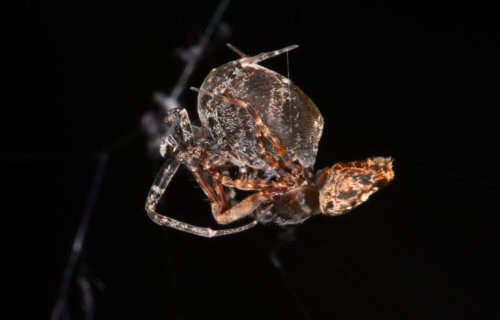WUHAN, China — A species of male spider is able to catapult itself in a split-second to avoid being eaten by the female after mating, a new study reveals.
The orb-weaving spider Philoponella prominens is able to dart away at up to 88 centimeters per second — that’s half the length of a full-sized bed — in a blink of an eye. The male spiders use a joint in their first pair of legs to immediately jump away before their female partner kills and consumes them. It’s the first study to describe this life-saving joint.
Researchers discovered this ability after seeing the few males who did not catapult quickly enough and died after mating. When the researchers prevented males from catapulting, they met the same fate.
Out of 155 successful encounters the study authors witnessed, 152 males survived by catapulting away. With high-resolution video cameras, speeds ranged from about 30 cm per second to almost 90 cm per second. As they soar through the air, the males also spin around 175 times per second on average.
Philoponella prominens are more common in China, Korea, and Japan and belong to a family of spiders that do not contain venom.
“We found that mating was always ended by a catapulting, which is so fast that common cameras could not record the details clearly,” says Dr. Shichang Zhang from Hubei University, according to a statement from SWNS.
“We observed that males that could not perform the catapulting were cannibalized by the female,” Zhang continues. “It suggests that this behavior evolved to fight against female’s sexual cannibalism under strong predation pressure of females.”
“Females may use this behavior to judge the quality of a male during mating,” the researcher concludes. “If a male could not perform catapulting, then kill it, and if a male could perform it multiple times, then accept its sperm.”
The findings are published in the journal Current Biology.
South West News Service writer Joe Morgan contributed to this report.

This is interesting behaviour, because it is also exactly what a lot of human males do.
Once the deed is complete, BING – outta here!
I do exactly this same thing.
Researchers discovered this ability after seeing the few males who did not catapult quickly enough and died after mating. When the researchers *prevented* males from catapulting, they met the same fate.
PREVENTED???
“If a male could not perform catapulting, then kill it, and if a male could perform it multiple times, then accept its sperm.”
Now tell me what is wrong with researchers.